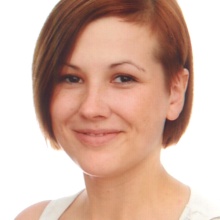Contact
Subject
Protein postranslational modifications (PTM) occur broadly accross human proteome. Interests in lysine methylation intensified when its role in chromatin remodeling was observed. Depending on the site and state of this PTM, histone methylation may either leads to activation or repression of gene transcription. Amino group of lysine residues may be mono-, di- or tri-methylated with each methylation state accompanied with distinct biological outcome. The studies on histone methylation also opened avenues to for searching other targets of lysine methyltransferases. In 2004 central tumor suppressor, p53, was found to be methylated which caused its stability and p53-mediated apoptosis in response to genotoxic stress. After that many others non-histone targets were identified. My research is focused on the central question of how lysine methylation reveals its biological function.
Investigation of reading domains with unknown function
Methylation does not substantially alter the lysine’ biophysical properties. Mainly, biological outcome is driven via so called ‘readers’ (reading domain), which not only recognize the methylation mark but also, distinguish between various methylation states. The functional readout of particular lysine methylation depends on ‘reader’ character. It can be: involved directly in formation of chromatin structure (ex. Heterochromatin protein 1); scaffold for binding of other proteins which induce local chromatin changes; adaptor factors which are involved in DNA metabolism (transcription factors, DNA replication and repair machinery). Despite great research efforts, the function of newly identified lysine methylation targets and their reading domains awaits elucidation. Our group examines reading domains with unknown functions.
Identification and characterization of new reading domains
High number of potential methylation sites in proteome almost guarantee that large number of readers with important biological function remains to be discovered. Moreover, mainly quantitative mass spectrometry (MS) methods are adpoted for identification of readers. Their main drawback is bias toward higher abundance proteins and limited detection of small scale interactions. Additionally, many interaction beside low abundance have high turnover rate and escape identification in MS approaches. Hence, development of cost-effective screening method for protein partners based on their methylation status is very timely and will bring significant progress in methyllysine readout.
Coordinated binding of multiple PTM provides a lock-key type mechanism for particular target proteins and ensures proper biological outcomes. Misreading of lysine marks has been shown to underlie human disease, including autoimmune, developmental abnormalities and cancer. Thus investigating the binding of the readers to methylated partners is not only important for elucidating fundamental mechanisms of cellular regulation but also necessary for design of targeted therapeutics.
Current position
Assistant Professor
Department of Biochemistry and Molecular Biology
Poznan Medical University
Poznan, Poland
Education
2009-2014: PhD, Department of Biochemistry and Molecular Biology, Poznan University of
Medical Sciences, Poland
2008-2009: Research Scholar, Department of Microbiology and Cell Science University of
Florida, Gainesville, USA
2006-2008: MSc, Adam Mickiewicz University, Poznan, Poland
2003-2006: BSc, Adam Mickiewicz University, Poznan, Poland
Fellowships/Awards
2015-2017: Marie Sklodowska-Curie Fellow
2015: Young Scientists Forum IUBMB, Sao Paulo, Brazil
2014: Bursary. FEBS/ EMBO 2014 Conference, Paris, France
2012-2013: Scholarship European Union Funds; Human Capital Program
2012/2014: Scientific Award of the Rector of the Poznan Medical University for
scientific achievements in the years 2011/2012 and 2014/2015
2012: Fellowship in BioInvents Company; “Implementation of innovative methods for the
identification of biomarkers in cancer”
2011: Fellowship in BioInfoBank Company; “Establishment of new e-teaching material and
development of quality control system for e-learning platform-Virtual Academy of
Bioinformatics”
2010: FEBS Young Scientist Forum, Gothenburg, Sweden
2007: International PMCB Internship (Research Scholar), Department of Microbiology and Cell
Science, University of Florida, USA


